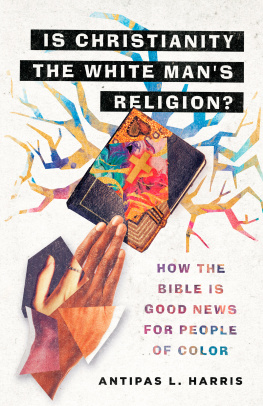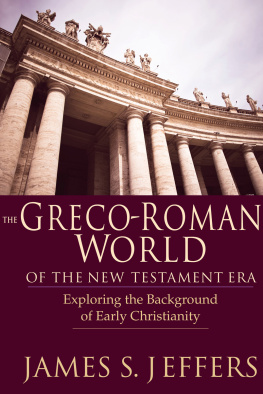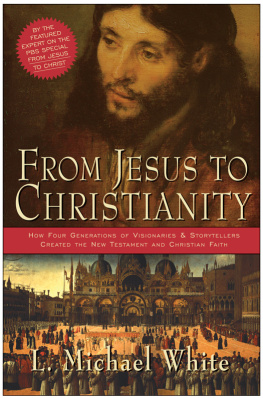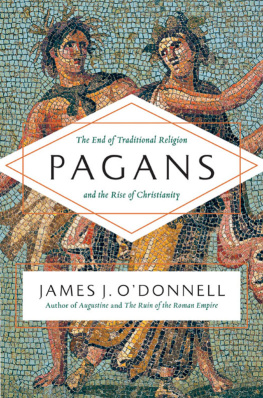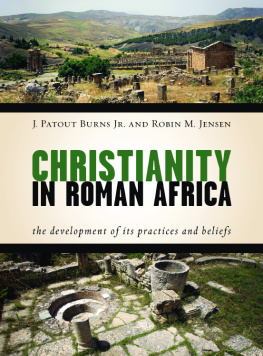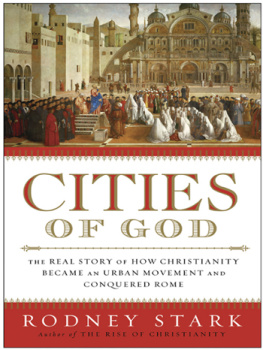Hurtado awakens us from our cultural amnesia, to remind us that the origin of Christianity and its remarkable success has more to do with its ability to distinguish itself from other religions in antiquity than to be one with them. Hurtado challenges readers to reconsider what have become common assumptions of religion todaythat there is a single God and that religious affiliation is a voluntary choice. Without the distinctive rise of Christianity, none of these would be so.
April D. DeConick, Chair of the Department of Religion, Rice University
This is a fascinating survey of the features that made Christianity distinctive in antiquity and soultimatelysuccessful. Hurtado discusses the Christian concept of an exclusive veneration of God, the trans-ethnic and trans-local religious identity, the central role of books and learning and distinctive and challenging forms of behavior within their ancient context. The glimpses into the first three centuries may even inspire contemporary Christians to find their identity and negotiate between social assimilation and difference.
Jrg Frey, Chair of New Testament Studies, University of Zrich
Comprehensive and quietly authoritative, Larry Hurtados Destroyer of the gods offers its readers a three-centuries tour of the Christianizing Mediterranean. The sweep of his panorama never sacrifices the liveliness of telling detail. For those who ask, What was distinctive about this new religious movement? Hurtado offers thoughtful answers. Make room for this book, whether on bedside table or in classroom syllabusor both.
Paula Fredriksen, Distinguished Visiting Professor of Comparative Religion at The Hebrew University
In this very accessible and readable book, Larry Hurtado shows how really distinct early Christianity was in comparison to its surrounding cultures of Greco-Roman paganism and Judaism. This was certainly true for aspects of early Christian life that are somewhat familiar to many of us, such as its stricter sexual code, but even here Hurtado shows that the early Christians took their code to the streets and opposed the double standard of their day. Destroyer of the gods is an exciting read across a wide range of interests in early Christianity coupled with many comparisons to religious life today.
Jan N. Bremmer, Professor Emeritus of Religious Studies, University of Groningen
In this lucid and wide-ranging book, Larry Hurtado convincingly shows how novel and distinctive early Christianity was in the religious world of the first century. He argues that early Christianity was in many respects a different kind of religion, and was revolutionary in the way that religion has been understood ever since. Along the way, Hurtado sheds much light on the New Testament and on second century Christianity. He hopes to enhance our appreciation of the remarkable religious movement that was early Christianity, and he admirably achieves exactly that.
Paul Trebilco, Professor of New Testament, University of Otago
Clear and enlightening, Hurtados coverage of the first centuries of Christianity explains why it was different, more philosophy than religion, and how its emergence as the supreme religion in the Roman world is less paradoxical than usually argued. This account is the nearest one can get to meeting an early Christian and quizzing them.
Robin Cormack, Emeritus Professor, Courtauld Institute of Art
Also by Larry W. Hurtado
Text-Critical Methodology and the Pre-Caesarean Text: Codex W in the Gospel of Mark
One God, One Lord: Early Christian Devotion and Ancient Jewish Monotheism
The Gospel of Mark: New International Biblical Commentary
At the Origins of Christian Worship: The Context and Character of Earliest Christian Devotion
Lord Jesus Christ: Devotion to Jesus in Earliest Christianity
How on Earth Did Jesus Become a God? Historical Questions about Earliest Devotion to Jesus
The Earliest Christian Artifacts: Manuscripts and Christian Origins
God in New Testament Theology
Why on Earth Did Anyone Become a Christian in the First Three Centuries?
Destroyer of the gods
Early Christian Distinctiveness in the Roman World
Larry W. Hurtado
Baylor University Press
2016 by Baylor University Press
Waco, Texas 76798
All Rights Reserved. No part of this publication may be reproduced, stored in a retrieval system, or transmitted, in any form or by any means, electronic, mechanical, photocopying, recording, or otherwise, without the prior permission in writing of Baylor University Press.
Cover Design by Will Brown
Cover Image: Protome of a Female Figure, artist unknown. Terracotta, Tarentum (Taras), South Italy, 440430 BC. Digital image courtesy of the Gettys Open Content Program.
This ebook was converted from the original source file. Readers who encounter any issues with formatting, text, linking, or readability are encouraged to notify the publisher at BUP_Production@baylor.edu. Some font characters may not display on all ereaders.
To inquire about permission to use selections from this text, please contact Baylor University Press, One Bear Place, #97363, Waco, Texas 76798.
Library of Congress Cataloging-in-Publication Data
Names: Hurtado, Larry W., 1943 author.
Title: Destroyer of the gods : Early Christian distinctiveness in the Roman world / Larry W. Hurtado.
Description: Waco : Baylor University Press, 2016. | Includes bibliographical references and index.
Identifiers: LCCN 2016006230 (print) | LCCN 2016023781 (ebook) | ISBN 9781481304733 (hardback : alk. paper) | ISBN 9781481305396 (web pdf) | ISBN 9781481305389 (mobi) |ISBN 9781481304757 (epub)
Subjects: LCSH: Church historyPrimitive and early church, ca. 30600.
Classification: LCC BR165 .H77 2016 (print) | LCC BR165 (ebook) | DDC 270.2dc23
LC record available at https://lccn.loc.gov/2016006230
To
Shannon
para siempre
Contents
I began this book with the simple aim of highlighting some features of earliest Christianity that made it distinctive, even odd, in the cultural environment of the first three centuries AD. As the work progressed, however, the additional observation recurred that these features that made earliest Christianity odd in that setting have subsequently shaped assumptions about religion in large parts of our world today. The focus remains historical, however. The following chapters dwell mainly on phenomena of those first three centuries, both because that is the period of my own scholarly focus over several decades and because I happen to think that, on any basis, it is the most interesting and exciting period of Christian history. But I have tried to show briefly that each of the features of earliest Christianity discussed in this book has become (especially for many people in the Western world) an unexamined commonplace notion.
Among both the scholarly guild and the wider public, there is a widespread presumption that all religions are basically the same, with insignificant variations of beliefs and practices, but essentially fitting one conceptual box. Departments of Religion in universities and colleges implicitly reflect this view, and a good many textbooks on religion(s) in various disciplines do so explicitly. At a high level of generalization, and with a careful selection of examples, it is possible to sustain this presumption. But a more wide-ranging analysis, both chronologically and across various cultures and examples, should readily put it to rest as flawed.
Some religions and religious groups do have strong resemblances to one another, and what modern scholars call religion has often played a similar role in various societies/cultures in various periods. Take Christianity, for example. For over fifteen hundred years of European history, institutional Christianity typically formed part of the establishment and served to promote the coherence of the various regimes with which it was allied. It was, in short, a social institution and as such affirmed, promoted, and defended the structures of society. From this specific history, there then developed the generalization, influentially among European scholars, that all religions typically play this kind of role of social conservatism.
Next page

